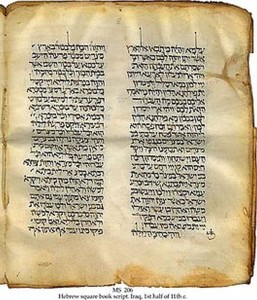The new proposed document focuses on menstruation, inappropriate sexuality, boastfulness, walls, fake news, and the term “sad.”
 Tel Aviv, February 18 – A venerable hypothesis regarding the sources of verses and passages in the first five books of the Hebrew Scriptures may have to undergo further modification, experts reported this week, following the proposal of an additional source behind numerous impolite, sexual, scatological, or otherwise inappropriate sections, a source that scholars also believe dyes his hair a reddish-blond color, married three times, owns numerous casinos and hotels, and recently crossed the medical line between overweight and obese.
Tel Aviv, February 18 – A venerable hypothesis regarding the sources of verses and passages in the first five books of the Hebrew Scriptures may have to undergo further modification, experts reported this week, following the proposal of an additional source behind numerous impolite, sexual, scatological, or otherwise inappropriate sections, a source that scholars also believe dyes his hair a reddish-blond color, married three times, owns numerous casinos and hotels, and recently crossed the medical line between overweight and obese.
Writing in the coming issue of Biblical Archaeology, a team of researchers from Heidelberg and Yale Universities laid out their new hypothesis, which adds to the conventional division of the Bible’s first five books into a handful of main authors, with the new proposed document serving as the source for passages such as those focusing on menstruation, inappropriate sexuality, boastfulness, walls, fake news, and the term “sad.”
“We believe we have firm evidence of another contributor which puts a new wrinkle in the Neo-Documentary Hypothesis,” sated lead author Professor Brian Krassenstein of Heidelberg. “According to the analyses and comparative textual studies we’ve performed, there is a separate source in addition to the existing JE, P, and D documents, which apparently enjoys golf, well-done steak with ketchup, adultery, the limelight, and unfiltered use of Twitter. We have dubbed this proposed source ‘T’.”
The Documentary Hypothesis of Biblical authorship held sway in academic circles for nearly two centuries, but consensus of its ability to explain the origins of the Five Books of Moses eroded during the twentieth century as new analysis and evidence pointed to inconsistencies and problems with its assumptions. Whereas Jewish and Christian traditions ascribe authorship of Genesis, Exodus, Leviticus, Numbers, and Deuteronomy to the prophet Moses, academic scholarship from the eighteenth century onwards has insisted the textual and archaeological evidence points to multiple authors and redactors who lived much later than the second-millennium-BCE period where tradition places Moses. A modified form of the hypothesis called “neo-documentary” has since emerged, though not without its detractors and challengers. The proposed T Document may help shore up support for the Neo-Documentary Hypothesis, notes Professor Julius Wellhauser of the Jewish Theological Seminary, who was not involved in the research.
“It was many of those rude terms and passages that gave the original theory some of its problems,” explained Wellhauser in a tweet. “Lamestream academia thinks it can discredit the Greatest Theory in History, but it can’t! Sad! Lock It Up!”
Please support our work through Patreon.




